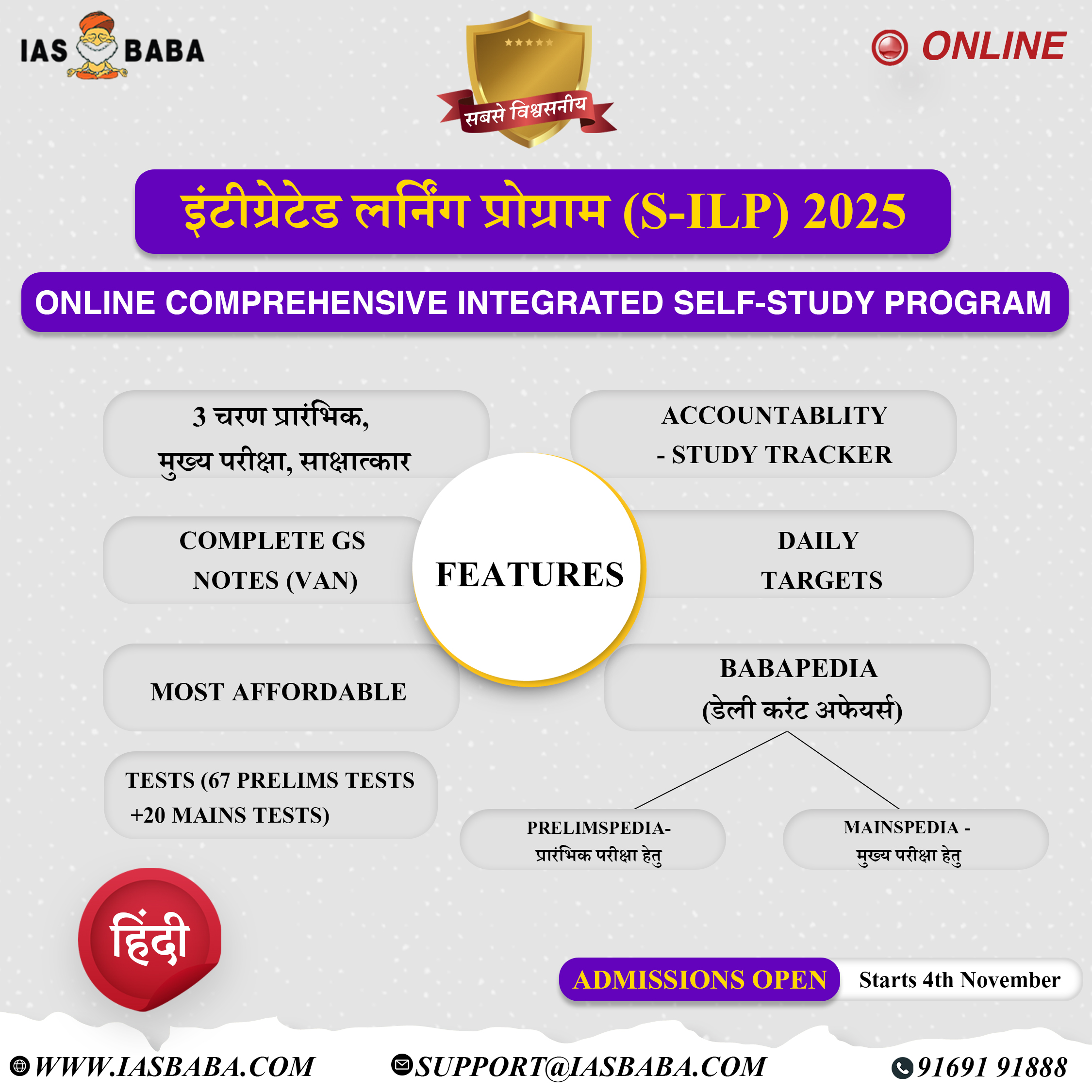IASbaba's Daily Current Affairs Analysis
IASbaba’s Daily Current Affairs (Prelims + Mains
Focus)- 29th November 2018
Archives
(PRELIMS + MAINS FOCUS)
Lancet report warns about heatwave exposure surge
Part of: GS Mains II and III – Health issues; Impact of Climate Change
In news:
- Indians faced almost 60 mn heatwave exposure events in 2016, according to Lancet report.
- It recommended Indian policy makers to take a series of initiatives to mitigate the increased risks to health, and the loss of labour hours due to a surge in exposure to heatwave events.
- Report has placed India amongst the countries who most experience high social and economic costs from climate change.
Do you know?
- Heatwaves are associated with increased rates of heat stress and heat stroke, worsening heart failure and acute kidney injury from dehydration.
- From 2014-2017, the average length of heatwaves in India ranged from 3-4 days compared to the global average of 0.8-1.8 days.
- Indians were exposed to almost 60 million heatwave exposure events in 2016, a jump of about 40 million from 2012.
- The agriculture sector was more vulnerable compared to the industrial and service sectors because workers there were more likely to be exposed to heat.
Lancet report recommendations include –
- identifying “heat hot-spots” through appropriate tracking of meteorological data
- promoting timely development and implementation of “local Heat Action Plans” with strategic inter-agency co-ordination
- timely response which targets the most vulnerable groups
- urges a review of existing occupational health standards, labour laws and sectoral regulations for worker safety in relation to climatic conditions.
What is Heat Wave?
- A heat wave is a prolonged period of excessively hot weather, which may be accompanied by high humidity, especially in the west coasts of the middle latitude continents.
- A heat wave is measured relative to the usual weather in the area and relative to normal temperatures for the season. Temperatures that people from a hotter climate consider normal can be termed a heat wave in a cooler area if they are outside the normal climate pattern for that area.
How does it occur?
- Heat waves are most common in summer when high pressure develops across an area. High pressure systems are slow moving and can persist over an area for a prolonged period of time such as days or weeks.
Consequences of Heat Wave
- Severe heat waves have caused catastrophic crop failures, thousands of deaths from hyperthermia, and widespread power outages due to increased use of air conditioning. A heat wave is considered extreme weather, and a danger because heat and sunlight may overheat the human body
Are criminal laws ill-equipped to deal with cases of riots?
Part of: GS Mains II – Indian polity; Government laws and policies; Policy reforms
In news:
- According to Delhi High Court, general criminal law is ill-equipped to deal with communal riots cases.
- The statement was made after the HC upheld the conviction of 70 persons on the charges of rioting, burning houses and violating curfew during the 1984 anti-Sikh riots.
The HC observed that – after each event of communal riots, allegations of political influence have worked as the root cause or for protection of those responsible. It has suggested for several reforms –
- Entrusting investigative and prosecution process in such cases to authorities other than normal agencies of the State.
- The High Court wondered if the initial task of gathering evidence or the duty to “preserve” evidence can be entrusted to the Human Rights Commissions in cases of communal riots situations.
- Once a Commission of Inquiry is instituted, under the Commission of Inquiry Act, 1952, further investigative process by gathering all evidence for such cases can be taken over by such Commissions of Inquiry.
Crux –
- The court suggested amendments to the Commissions of Inquiry Act, 1952 and the Protection of Human Rights Act, 1993 to entrust the responsibility of investigation in communal riots through SITs specially constituted under their respective control.
- With the technological advancements that have been made and the rise of media — print and electronic — as an effective fourth pillar of democracy, the HC said there was a strong case for utilising as evidence the press reports, supported by photographic material or video footages in trials of criminal cases arising out of communal riots.
‘44 violations took place in Andamans’
Do you know?
- As many as 44 violations by foreigners have taken place in recent past in restricted areas of Andaman and Nicobar islands.
- Restricted Area Permit (RAP) – this policy allows people to visit certain locations with permission.
- The RAP for foreigners and Indians was recently liberalised by the Centre.
- Now, RAP may be reimposed in the Andamans following the recent killing of an American by inhabitants on North Sentinel Island, a highly reclusive and protected tribe.
- Though the RAP was withdrawn in 29 islands, tourists are required to take permission from the Forest Department and the administration of the Andamans as it is protected under two other Acts — protection of aboriginal people and forest Acts.
Russia and Ukraine tensions
Part of: GS Prelims and Mains II – International Relations
In news:
- Russia has captured three Ukrainian naval ships and over 20 crew members in the disputed Azov Sea.
- This move has refocussed international attention on the conflict on Europe’s eastern corridors.
- Ukraine has declared martial law and demanded that the sailors be treated as prisoners of war.
- Ukraine insists that the patrol of the Kerch Strait, where the vessels were impounded, was authorised under a bilateral agreement with Moscow.
- The latest incident coincides with the anniversary of the November 2013 Maidan Square protests in Ukraine demanding integration with Europe, which was the prelude to Russia’s invasion of Ukraine’s Crimea in 2014.
Do you know?
- The 2014-15 Minsk peace accords prohibited air strikes and heavy artillery firing.
- The Ukraine-Russia conflict has also widened religious schisms.
(MAINS FOCUS)
NATIONAL
TOPIC:General studies 1 and 2
- Protection of primitive tribes
- Social issues; vulnerable sections of the society
Lessons from a tragedy: On Adaman & Nicobar
Introduction
- The tragic death of an American adventurer in the protected “tribal reserve” of North Sentinel Island in the Andaman and Nicobar Islands archipelago has triggered global interest in the region.
- There are debates about peculiar and almost brutal hostility displayed by the Sentinel islanders towards the outsider. Some see it as signs of a pathological “primitivity” and the result of “complete isolation” from “civilisation” while others interpret it as an effect of the historical memory of colonial brutality.
On the question of hostility and isolation
- Change in shape of their canoes, use of iron to make blades and arrowheads, glass bead necklaces etc all point to the fact that over the years Sentinelese have not remained completely isolated.
- There are images which show them receiving coconuts, bananas and other gifts from government contact parties.
- Thus Sentinelese decide on spot what contact is safe and useful- pointing to the fact that their hostility is rather ‘strategic’ to ensure survival, rather than borne out of primitivity.
Why hasn’t Indian government pacified Sentinelese into contact ?
- Unlike the colonial predecessors, Indian government has rightly abstained from coercing indigenous communities into assimilation.
- Tribal welfare policy in the islands today not only ensures their protection but also accept their right to self-determination.
Problem with protection
- Policies of “protection” demand strong surveillance infrastructures, empowered staff, coordination among police, forest and welfare agencies and, more importantly, investment in projects of sensitisation.
- It is tensions between the common settler-indigene relations on the islands leads to collusive breaches of the law and the undermining of the protective cover for the Sentinelese and other Particularly Vulnerable Tribal Groups (PVTGs) like the Jarawas.
Why vulnerable to intrusions?
- The Indian government though gave it a free society status but used it as a space to settle its “excess” population – like the refugee rehabilitation schemes in the post- Partition years.
- Though cared for and protected, they had to move out of their original forest habitats into newly designated “tribal reserves”.
- As a result of continuous settlement and often ill-conceived developmental projects on the islands over the past six decades, these reserves have become increasingly vulnerable to the intrusions of poachers, encroachers and tourists.
Do you know?
Tribal Panchsheel Policy by Jawaharlal Nehru
- Non-imposition: People should develop along the lines of their own genius, and the imposition of alien values should be avoided.
- TribaI rights in land and forest should be respected.
- Teams of tribals should be trained in the work of administration and development. Introducing too many outsiders into tribal territory should be avoided.
- TribaI areas should not be over administered or overwhelmed with a multiplicity of schemes.
- Results should be judged not by statistics or the amount of money spent, but by the human character that is evolved.
Conclusion
- It is important to draw a few lessons from the recent unfortunate death and question the ways in which mainland India views the islands.
- The announcement of new projects for “holistic” development of Andaman and Nicobar Islands should consider a context-sensitive “island view” of development and recognise settlers and PVTGs as equal stakeholders in a common sustainable future.
Connecting the dots:
- The indigenous communities and settlers in the Andaman & Nicobar Islands must be equal stakeholders in a common future. Comment.
ECONOMY
TOPIC:General studies 2 and 3
- International relations
- Indian Economy; Economic development
Breathing space: on the strengthening rupee
Introduction
- Indian Rupee has appreciated against the US Dollar in recent week due to the fall in global crude oil prices.
- Since imported oil meets about 80% of India’s total demand, the fortunes of the rupee have been tightly linked to the price of crude oil in the global markets.
Why is there a fall in global crude oil prices?
- Continuation of supply of crude oil from Iran after U.S. has softened its stance against Iran.
- S. turned into the largest crude oil producer in the world with the boom in shale production.
- Lowering of projection of demand of crude oil
- Faltering growth in major economies like China may have also contributed to the fall in prices.
Benefits for India
- The fall in global crude oil prices comes as a big relief to the Central government, which has faced increasing macroeconomic and political pressure due to rising prices.
- A drop of $10 in the price of oil can improve India’s current account and fiscal deficits by 0.5% and 0.1% of GDP, respectively.
- The ruling party may be pleased with falling oil prices in the run-up to the general elections next year.
- Fuel prices across major Indian cities have fallen significantly.
- The Reserve Bank of India will be relieved as it will have to worry less about the rupee and oil-induced inflation.
- Foreign investors, who have been net sellers this year, have turned net buyers this month.
- This points to an increase in investor confidence in the economy as the fundamentals improve.
Conclusion
- Amid rising global uncertainties, it may not be so easy to map what lies ahead for global crude oil prices and the rupee.
- Forthcoming meeting of the Organisation of the Petroleum Exporting Countries will make clear the response of oil producers to the sharp fall in prices.
- Shale companies are also likely to respond to falling prices by cutting production.
- India should capitalise on the relief offered by the fall in oil prices to improve its preparedness for any future jump in oil prices.
Connecting the dots:
- Fall in oil prices gives the rupee and the Indian economy a much-needed boost. Critically comment.
(TEST YOUR KNOWLEDGE)
Model questions: (You can now post your answers in comment section)
Note:
- Featured Comments and comments Up-voted by IASbaba are the “correct answers”.
- IASbaba App users – Team IASbaba will provide correct answers in comment section. Kindly refer to it and update your answers.
Q.1) Consider the following statements about ‘Global Climate Risk Index’
- It is published annually by UNEP
- It is based on an analysis of the number of deaths (due to climatic conditions) per 100,000 inhabitants, extent of financial losses and loss per unit of GDP of countries
Select the correct statements
- 1 Only
- 2 Only
- Both 1 and 2
- Neither 1 nor 2
Q.2) The Kerch Strait is a strait connecting the –
- Black Sea and the Sea of Azov
- Sea of Marmara and Aegean Sea
- Black Sea and the Sea of Marmara
- Black Sea and Mediterranean Sea
Q.3) Consider the following statements with regard to the Sea of Azov
- It is the shallowest sea in the world.
- It is a sea in Eastern Europe.
Which of the statements given above is/are correct?
- 1 only
- 2 only
- Both
- None
MUST READ
In a spirit of accommodation
Without maternity benefits
Trade vs Terror
Ludo vs Snakes & Ladders
Mother Ganga, Father Rhine
Genetic modification goes beyond ethics
What can India teach us about start-ups?











